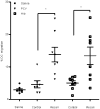Tetanus toxoid and CCL3 improve dendritic cell vaccines in mice and glioblastoma patients
- PMID: 25762141
- PMCID: PMC4510871
- DOI: 10.1038/nature14320
Tetanus toxoid and CCL3 improve dendritic cell vaccines in mice and glioblastoma patients
Abstract
After stimulation, dendritic cells (DCs) mature and migrate to draining lymph nodes to induce immune responses. As such, autologous DCs generated ex vivo have been pulsed with tumour antigens and injected back into patients as immunotherapy. While DC vaccines have shown limited promise in the treatment of patients with advanced cancers including glioblastoma, the factors dictating DC vaccine efficacy remain poorly understood. Here we show that pre-conditioning the vaccine site with a potent recall antigen such as tetanus/diphtheria (Td) toxoid can significantly improve the lymph node homing and efficacy of tumour-antigen-specific DCs. To assess the effect of vaccine site pre-conditioning in humans, we randomized patients with glioblastoma to pre-conditioning with either mature DCs or Td unilaterally before bilateral vaccination with DCs pulsed with Cytomegalovirus phosphoprotein 65 (pp65) RNA. We and other laboratories have shown that pp65 is expressed in more than 90% of glioblastoma specimens but not in surrounding normal brain, providing an unparalleled opportunity to subvert this viral protein as a tumour-specific target. Patients given Td had enhanced DC migration bilaterally and significantly improved survival. In mice, Td pre-conditioning also enhanced bilateral DC migration and suppressed tumour growth in a manner dependent on the chemokine CCL3. Our clinical studies and corroborating investigations in mice suggest that pre-conditioning with a potent recall antigen may represent a viable strategy to improve anti-tumour immunotherapy.
Conflict of interest statement
The authors declare the following competing financial interests: D.A.M., K.A.B., and J.H.S. have filed provisional patents related to the use of Td pre-conditioning as a method to improve immunization efficacy. D.A.M. has served as a paid member of the Schering Plough North American Investigators Advisory Board. S.K.N. is a co-inventor on a patent that describes the use of DCs transfected with tumor antigen encoding RNA that has been licensed by Argos Therapeutics (Durham, NC) through Duke University. S.K.N. has no financial interests in Argos Therapeutics and is not compensated by Argos Therapeutics. D.A.R. has served as paid speaker for Schering/Merck and Genentech/Roche. The remaining authors declare no competing financial interests.
Figures













Comment in
-
Cancer immunotherapy: dendritic-cell vaccines on the move.Nature. 2015 Mar 19;519(7543):300-1. doi: 10.1038/nature14211. Epub 2015 Mar 11. Nature. 2015. PMID: 25762139 No abstract available.
-
Immunotherapy: Primed for a response.Nat Rev Cancer. 2015 May;15(5):258-9. doi: 10.1038/nrc3945. Epub 2015 Apr 2. Nat Rev Cancer. 2015. PMID: 25833215 No abstract available.
-
Tetanus shot may improve glioblastoma treatment.Cancer Discov. 2015 Jun;5(6):571. doi: 10.1158/2159-8290.CD-NB2015-053. Epub 2015 Apr 15. Cancer Discov. 2015. PMID: 25877510
-
Cancer immunotherapy: Primed for a response.Nat Rev Drug Discov. 2015 May;14(5):312. doi: 10.1038/nrd4620. Epub 2015 Apr 24. Nat Rev Drug Discov. 2015. PMID: 25907340 No abstract available.
References
-
- Steinman RM, Banchereau J. Taking dendritic cells into medicine. Nature. 2007;449:419–426. - PubMed
-
- Palucka AK, et al. Spontaneous proliferation and type 2 cytokine secretion by CD4+T cells in patients with metastatic melanoma vaccinated with antigen-pulsed dendritic cells. J Clin Immunol. 2005;25:288–295. - PubMed
-
- Palucka AK, et al. Single injection of CD34+ progenitor-derived dendritic cell vaccine can lead to induction of T-cell immunity in patients with stage IV melanoma. J Immunother. 2003;26:432–439. - PubMed
-
- Palucka AK, et al. Dendritic cells loaded with killed allogeneic melanoma cells can induce objective clinical responses and MART-1 specific CD8+ T-cell immunity. J Immunother. 2006;29:545–557. - PubMed
Publication types
MeSH terms
Substances
Grants and funding
- R01 NS067037/NS/NINDS NIH HHS/United States
- P50 CA108786/CA/NCI NIH HHS/United States
- P50 NS020023/NS/NINDS NIH HHS/United States
- R01-CA134844/CA/NCI NIH HHS/United States
- P01 CA154291/CA/NCI NIH HHS/United States
- R01 CA235612/CA/NCI NIH HHS/United States
- R01 CA134844/CA/NCI NIH HHS/United States
- P01-CA154291-01A1/CA/NCI NIH HHS/United States
- UL1 RR024128/RR/NCRR NIH HHS/United States
- P50-CA108786/CA/NCI NIH HHS/United States
- 1UL2 RR024128-01/RR/NCRR NIH HHS/United States
- P50-NS20023/NS/NINDS NIH HHS/United States
- R01-CA177476-01/CA/NCI NIH HHS/United States
- T32 GM007171/GM/NIGMS NIH HHS/United States
- UL1 TR001427/TR/NCATS NIH HHS/United States
- R01-NS067037/NS/NINDS NIH HHS/United States
- T32 AI052077/AI/NIAID NIH HHS/United States
- R01 CA177476/CA/NCI NIH HHS/United States
LinkOut - more resources
Full Text Sources
Other Literature Sources
Medical
Molecular Biology Databases
Research Materials

